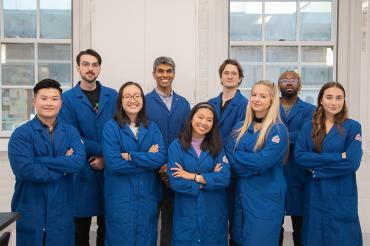U of T Engineering lab partners with Moderna to develop RNA-based tools to treat and prevent disease

Assistant Professor Omar F. Khan ( back row, second from left) and his lab team focus on diseases that are currently incurable and untreatable (photo by Safa Jinje)
Published: October 21, 2022
A team of researchers at the University of Toronto’s Faculty of Applied Science & Engineering has partnered with biotechnology company Moderna to develop next-generation RNA platform technologies.
This industry-university strategic research agreement is the first academic partnership under the collaborative partnership framework agreement between U of T and Moderna.
“We are making new kinds of nanotechnology and RNA to help prevent and cure diseases. Together, we’re driving new technological innovations to provide patients with even more options for highly efficacious RNA-based medicines,” says Omar F. Khan, an assistant professor at the Institute of Biomedical Engineering who is leading the U of T research team and holds the Canada Research Chair in Nucleic Acid Therapeutics.
“Moderna has an incredible track record of taking research from idea to clinic. This partnership is a great opportunity for us to reach our collective goal of efficiently engaging the body to treat and prevent diseases.”
As demonstrated by the success of its COVID-19 vaccine, Moderna is an established name in messenger RNA (mRNA) science. Now, Moderna and Khan’s lab group are leveraging fundamental knowledge of chemistry, engineering, biology and immunology to design new types of RNA and their safe, effective delivery to the body.
“We believe mRNA is a platform that could significantly improve the way treatments and vaccines are discovered, developed and produced,” says Shehzad Iqbal, country medical director at Moderna Canada.
“It’s critical for the next generation of mRNA medicine to be fully controllable – we need both the understanding and ability to optimize delivery systems and their payloads to maximize the benefits of mRNA medicine while minimizing unwanted side effects.”
Ribonucleic acid, commonly referred to as RNA, is a nucleic acid in the same chemical family as DNA and it is found naturally in the body. While DNA encodes all human genes, RNA is involved in the expression and regulation of those genes, including their translation into proteins. Certain viruses also use RNA as genomic material, including SARS-CoV-2.
Delivering customized RNA sequences into the body could offer a way to inhibit undesirable processes and stimulate beneficial ones. For example, researchers could use RNA constructs to block biochemical processes that enable cancer tumours to grow and metastasize, or to help the body’s immune system fight off infections.
RNA-based therapeutics have the potential to treat many diseases – from diabetes to cancer to musculoskeletal diseases – through targeted approaches that focus on the biochemical pathways those diseases exploit. RNA molecules could be used to combat genetic diseases, by either silencing some genes or enhancing the expression of others, all without genome editing or the use of small-molecule drugs.
Despite this potential, RNA is a comparatively fragile molecule. To do its job, it needs to be delivered in a package that protects the material from damage and preserves its potency as it is delivered and stored around the world. The packaging also enables cells to take up the RNA sequence and read its instructions.
The new partnership will design both those delivery vehicles, and the customized RNA sequences they will contain.
“On the nanotechnology side, we are working on delivery molecules,” says Khan. “On the RNA side, we are working with mRNA, which people are familiar with. We’re also going beyond mRNA to create new and advanced technology that can prevent and treat diseases.”
Khan brings an effective blend of academic and industry experience to the Moderna partnership. His research was recently supported by Medicine by Design’s Pivotal Experiment Fund – a program that backs a pre-clinical pipeline of regenerative medicine-based therapies that have a strong potential for clinical and/or commercial impact.
“The Khan lab has deep expertise in identifying ‘what comes next’ and Moderna brings significant manufacturing and development experience to help realize that next big thing Dr. Khan and his team are dreaming up,” says Iqbal.
“Working with Moderna, a leader in RNA medicine that has helped countless lives, is a wonderful opportunity for all my trainees,” adds Khan. “My team can showcase their innovative talent and work toward our mutual goal of using science and engineering to improve the health of people across the world. The global health impact is very tangible.”
“Together, we’re looking ahead, and we’re foreseeing the true value of nanotechnology and RNA in its many forms.”



